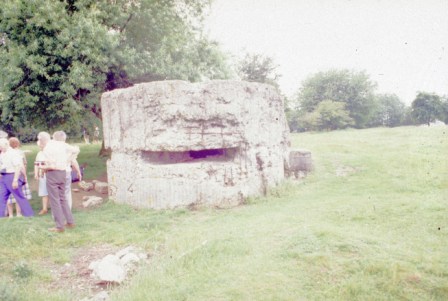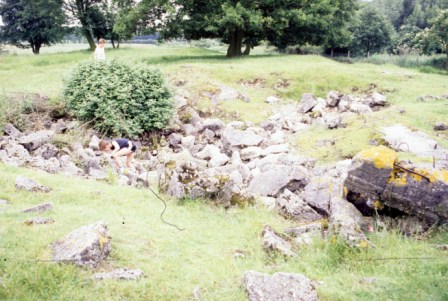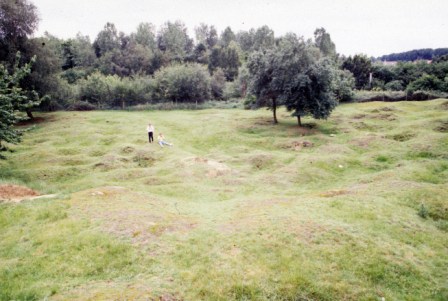
CARR, ERNEST WILLIAM

Photograph with kind permission from the Uttoxeter Advertiser
|
|
Source |
||||
|
CWGC |
SDGW |
Uttoxeter Advertiser |
Other |
||
|
Parents |
Herbert William and Sarah Helen Carr |
Yes |
|
|
|
|
Where born |
Uttoxeter |
|
Yes |
|
|
|
When born |
|
|
|
|
|
|
Address |
Parents: The Crescent, Uttoxeter |
Yes |
|
Yes |
|
|
Spouse |
|
|
|
|
|
|
Children |
|
|
|
|
|
|
Employment Before Joining up |
Dental Assistant to Mr. J.R. Brown |
|
|
|
|
|
Where enlisted |
Hanley, Staffordshire |
|
Yes |
|
|
|
Regiment |
North Staffordshire (Prince of Wales’s) |
Yes |
Yes |
|
|
|
Unit |
1st/5th Bn. |
Yes |
Yes |
|
|
|
Rank |
Private |
Yes |
Yes |
|
|
|
Service Number |
2791 |
Yes |
Yes |
|
|
|
Date of Death |
2nd September 1915 |
Yes |
Yes |
|
|
|
Age at time of death |
20 |
Yes |
|
|
|
|
Where Killed or died |
Hill 60, Ypres salient |
|
|
|
|
|
How he died |
Killed in action |
|
Yes |
|
|
|
Location of Grave or Memorial |
Larch Wood (Railway Cutting) Cemetery Grave I.F.7 |
|
|
|
|
|
Awards |
|
|
|
|
|
According to the CWGC, he was a native of Hollington, Staffs.
He was the eldest son and educated at Newcastle (Under Lyme) High School and while there he was a member of the Officers’ Training Corps.
Up to the time of enlisting, he was employed as an assistant to Mr. J. R. Brown, dentist, of Uttoxeter.
He enlisted in about September 1914 with a number of other old boys of Newcastle High School, and went to France in March 1915. He was sent to the trenches a month later.
He was well-known and highly thought of by a large circle of friends in Uttoxeter . He was also a member of the local Rugby and Swimming Clubs.
The Uttoxeter Advertiser quoted a very touching letter which, a friend, Second-Lieutenant Saunders, of the 8th North Staffordshire Regiment, had sent to Ernest’s parents:
“…I have just heard the awful news about Ernest, and although I am at a complete loss as to what to say to you, I feel I must write you just a few lines.
“At school I think he was my greatest chum – it was seldom we were not together. This news will upset my mother very much, for she thought a great deal of Ernest. It will be a long time before I realise that we shall have no more happy days together; for certainly some of the happiest days of my life were spent in his company. I was with him in the 5th North till the beginning of the year, when I was gazetted to this regiment. I often tried to persuade Ernest to take a commission, for with his O.T.C. experience, he could easily have obtained one, but he preferred to stay with his old unit.
“I am writing you this in my dug-out in the trenches during a bombardment, so I hope you will make all allowances. I know it will be a long time before you can look upon his death in any other light but that somebody has blundered somewhere; but if anything happens to me my mother will have given her all, for she has no other sons to whom she can turn.”
He went on to say,
“Well, I can only add that he helped me along as much as anybody I have lived with yet. I am sure that the knowledge that he was at his post when the call came will be a great consolation to you in the days to come. And I’m sure I am right in saying that he would be one of the last to wish you to grieve overmuch for him. I am thankful he was spared any pain - it is heart-breaking to see some of our poor fellows suffering...I find it absolutely impossible to express my feelings. The 5th North have lost a soldier. I know that I have lost a friend in whom I could trust, and I've lived long enough to find out that the world has none too many such friends. Let the knowledge that he did his duty and that he died as a Christian soldier be your comfort in the days to come..''.
Ernest’s obituary, published in the Uttoxeter Advertiser on 5th September 1915, also included details of a letter sent to his parents by the Quartermaster Sergeant:
“I can assure you we all mourn his loss, for he was a good soldier, and always did his work without a word up to the last. He died the noble death of a soldier like many of his friends who joined along with him at Newcastle”
The customary official notification was also received from the War Office, along with a note expressing the sympathy of the King and Queen with the bereaved relatives.
Ernest Carr died at Hill 60.
Hill 60 was a piece of ground which was only slightly higher than the surrounding area. It got its name from the fact that it was 60 feet above sea level. It was only a tiny hill by normal standards, but as it was one of only a few hills in a vast flat area, its occupiers could see for miles. This gave them a strong tactical advantage and occupation of Hill 60 was hotly disputed.
The Germans occupied a number of blockhouses on Hill 60 and these were defended by thick belts of barbed wire and by machine guns. It was only when these blockhouses were destroyed that the allies finally occupied Hill 60. Meanwhile, it became a site of huge loss of life.
In recognition of the huge sacrifices involved in taking Hill 60, it was preserved after the war and has never been built on. The remains of the blockhouses are still there and the pock-marked ground bears witness to the ferocity of the shelling which went on there.
 |
 |
| This is one of the blockhouses which defended Hill 60. Machine-gun fire raked the surrounding area from blockhouses such as this | This is all that is left of one of the other blockhouses |
 |
|
| Shell-holes from the intense bombardments can still be made out on the ground of Hill 60 | |
Ernest Carr is buried in Grave I.F.7 in Larch Wood (Railway Cutting) Cemetery. Larch Wood Cemetery is situated 4 km south east of Ypres town centre